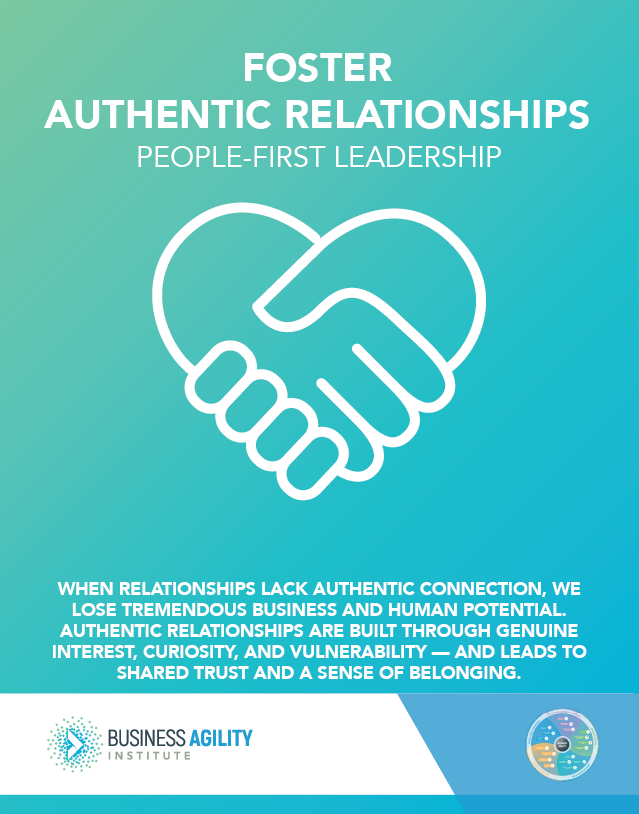Domains of Business Agility
- Responsive Customer-Centricity
- / Fiercely Champion The Customer
- / Sense & Respond Proactively
- / Integrate Diverse Ideas
- Engaged Culture
- / Cultivate A “Learning Organization”
- / Engage Transparently & Courageously
- / Embed Psychological Safety
- / Act As One
- Value-Based Delivery
- / Unleash Workflow Creatively
- / Prioritize. Prioritize. Prioritize.
- / Deliver Value Sooner
- / Seize Emergent Opportunities
- Flexible Operations
- / Adapt Strategies Seamlessly
- / Fund Work Dynamically
- / (Re)Organize Structures Fluidly
- / Balance Governance And Risk
- People-First Leadership
- / Foster Authentic Relationships
- / Empower With Accountability
- / Realize People’s Potential
Too many leaders (and systems) treat customers, colleagues, and employees transactionally. When relationships are devoid of authentic connection and genuine care and concern, we lose opportunities to unlock tremendous business and human potential. Authentic relationships are not built by artificial harmony or shallow interactions, but through honest, respectful discussions and debates. This starts with genuine interest, curiosity, and vulnerability — and leads to shared trust and a sense of belonging.
In addition to leading by example and investing in deep connections themselves, leaders need to create environments where investing in authentic relationships is encouraged for all and viewed as essential to the success of the business — not an option for people to engage in when they want. When invested in, authentic relationships maximize impact because they allow people to cut through the nonsense and politics to do the right thing for the customer.
Primary Behaviors
The following 3 behaviors strongly contribute to the ability to foster authentic relationships.
B69: Leaders create personal connections through empathy, listening, coaching, and mentoring: Leaders build relationships and act with social awareness to establish effective two-way communication with others in the organization.
B70: Executives invest in developing effective and human-centric people managers: We work with people managers at all levels of the organization to develop and continuously improve how they collaborate with and lead their direct reports and teams.
B71: Leaders support people throughout the change so that change is not a distraction from day to day work: Leading change is an integral part of a leader’s job, not a singular action to be initiated and then delegated. By actively leading the full cycle of change, leaders support their people to incorporate change into how they routinely work, rather than having it be a distraction.


